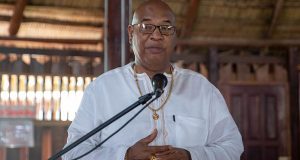By Kenton X. Chance
CMC Correspondent
KINGSTOWN, St. Vincent and the Grenadines, December 20, 2019 (CMC) – The St. Vincent and the Grenadines parliament passed legislation, aimed at protecting the intellectual property of breeders of new plant varieties of marijuana, here.
Agriculture Minister, Sabato Caesar, said the Plant Breeders’ Protection Bill, 2019 was a “trailblazing piece of legislation” that brings into focus, “how we have to always marry our quest to develop the agricultural sector with the best science”.
But, in his response, shadow minister of agriculture, Roland “Patel” Matthews, said while the main opposition New Democratic Party (NDP) had no fundamental objection to the legislation, the government did not mention marijuana and, as a result, may have implications for local strains of cannabis.
Matthews said that under the law, a person does not have to reside in the country, or be a citizen, to apply for a plant breeder’s right.
“So while there are advantages, I am concerned about the fact that it is a new thing for us; and while our local farmer are expect[ing] to benefit, I am hoping that the day will not come when we have an industry in St. Vincent flourishing for years, and we have to come back and ask for permission or buy seeds, for example, to plant whatever we are planting.”
But Caesar told lawmakers that the law protects the intellectual property of persons, who are engaged in plant breeding.
He said it also sets up the jurisprudential framework, within which these persons will be able to accrue the rights, how these rights will be protected, how they will be published, so that persons in the entire society, in the court and globally, can be aware of the hard work which was done.
“This doesn’t affect the farmers, who are going to reproduce some of these varieties on their own land,” he further stated, adding that the law also brings into focus, marrying with the best science, the nation’s quest to develop the agricultural sector.
“Some persons may wish to divorce agriculture, which is a science, from the deep scientific work, which should be involved. And this is not only for agriculture. It is also for fisheries and the other productive sectors that we are embarking on, as a people, as a country, to build,” Caesar said.
“If you utilise varieties that are not productive, you will not get the kind of return on your investment that you should obtain and, definitely, it will have a negative impact on our work to continue the transformation of the rural economy and national develop. It will have an impact on the export figure, on the important figures,” Caesar argued.
The Agriculture Minister said that plant breeding is the process by which the characteristics of a plant are changed, over time, to make them more prolific.
This includes making them more disease-resistant or tolerant, making the food from these plants more nourishing, or making the plant more productive.
Caesar pointed out that only two Caribbean countries — the Dominican Republic and Trinidad and Tobago — are members of the international convention that governs plant breeders’ rights.
He said with the new legislation, St. Vincent and the Grenadines will become the third country.
The law states that the registrar must grant a plant breeder’s right for every eligible application.
Under the law, a person must obtain the authorisation of a grantee, with respect to propagating material of the protected variety, to produce or reproduce, condition the material for the purpose of propagation, offer the material for sale, to sell the material, import or export the material, or stock the material for any of the previous purposes.
“So this basically speaks to the potential of plant breeders to operationalise an industry, as a result of the work and the intellectual properly that they would have been able to secure,” Caesar said.
Regarding infringement of plant breeders’ rights, several measles are exempt, including an act done privately for non-commercial purposes, an act done for experimental purposes, or an act done for the purpose of breeding other plant varieties.
The law also speaks to the privilege of farmers to grow the plant on their own land, without infringing the rights of the plant breeder. It allows for compulsory licences, where a person may apply to the court for the grant of compulsory licence to exploit a protected variety in St. Vincent and the Grenadines.
Subject to terms that the Court thinks fit, it may make an order for the granting of compulsory licences, if it is satisfied that the grant of the compulsory licences is in the public interest.
Offences under the law include, falsification of register and falsely representing plant variety as a protected variety.
The law also orders the registrar to publish: applications for plant breeders’ rights; proposed and approved denominations; withdrawals of applications for plant breeders’ rights; the rejection of applications for plant breeders’ rights; any grant of a breeder’s right; any change in the breeder or the agent; in respect of a plant variety; lapses of plant breeders’ rights; any invalidation or revocation of a plant breeder’s right; and the licence, in relation to plant breeders’ rights, where applicable.
Matthews noted that plant breeders’ rights are a form of intellectual property rights, by which plant breeders can protect their new varieties in the same way that an inventor protects his invention with a patient.
He said that St. Vincent and the Grenadines is a country that prides itself, on having agriculture as one of its exports.
“It is interest to me that in the year 2919 — we are just going into 2020 — we are now embarking on what we consider plant breeders protection,” the opposition lawmaker said, as he mulled over what triggered the law at this time.
Matthews said the bill had come to Parliament, one year and a day after lawmakers passed law for the legalisation of marijuana cultivation for medicinal purposes.
“And I believe that this bill is coming to this House because of what we did a year ago. Because it is the only commodity, right now in St. Vincent, that lends itself to the sort of protection that this bill — while there are others — but it lends itself most to the sort of protection that this bill intends to promote.”
Matthews said that the bill speaks to denomination, where the new plant species is given a code, by which it can be known.
“And that is your invention. It belongs to you,” he said, noting the conditions, under which another party can use the protected material.
“If a person has to do all of that, then you must have the permission or the authorisation of the owner of that commodity. Let us come home to reality. I talk about this as it relates to the medical cannabis industry and the poor Vincentian farmers.”
Matthews noted that some of the investors in the medical marijuana industry, here, are Canadians, saying “at the moment in Canada, there are plant breeders’ protection rights, given to investors in marijuana and persons who produce different varieties in marijuana”.
He said that, while people, talk about the different “high grade marijuana that we grow here, whether cannabis sativa or cannabis indica, whatever we grow, we do not have any protection in St. Vincent for our marijuana”.
 Pride News Canada's Leader In African Canadian & Caribbean News, Views & Lifestyle
Pride News Canada's Leader In African Canadian & Caribbean News, Views & Lifestyle





